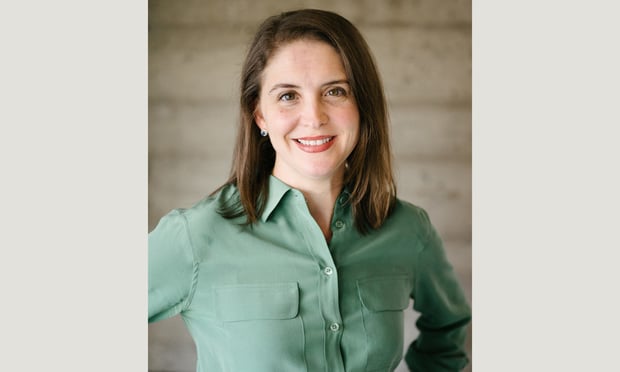How Credit Karma General Counsel Susannah Stroud Wright Became an In-House Leader
Wright discusses her winding path to the in-house world and how she used what she learned as a Big Law attorney, prosecutor and lawyer for Tesla to help build Credit Karma's robust compliance program.
October 09, 2019 at 01:01 PM
7 minute read
 Susannah Stroud Wright, general counsel, Credit Karma.
Susannah Stroud Wright, general counsel, Credit Karma.
Credit Karma Inc. general counsel Susannah Stroud Wright has drawn from her experiences as a Big Law attorney, prosecutor and lawyer for Tesla Inc. and its subsidiary SolarCity Corp. to help build a robust compliance program for the personal finance company.
Wright joined Credit Karma in 2017 as the San Francisco-based firm's first chief lawyer. She arrived at the company after having served as an associate GC for Tesla and as a deputy GC for SolarCity.
Before she went in-house, Wright had two stints in Big Law—first at Alston & Bird and later with Gibson, Dunn & Crutcher—separated by three years of service as a prosecutor for the Fulton County District Attorney's Office in Georgia.
Wright spoke with Corporate Counsel about her winding path to the in-house world and the compliance lessons she learned along the way. The conversation has been edited for clarity and length.
Corporate Counsel: You've had an interesting career. What spurred that last move from Big Law to the in-house world?
Susannah Stroud Wright: If you had asked me way back when if I would have ever found myself in-house, much less as a chief legal officer, I would've said you were out of your mind. That was never on the planned path. But what happened is a series of opportunities. That's one thing I try to tell the folks that I mentor and work with. Don't feel that you have to adhere to a strict five-year plan. The most important thing is being open to opportunities and focus on what matters most to you and where you love to develop skills. Making the switch, when I first went in-house at SolarCity, it came out of the blue. I actually went in talking to Seth Weissman, the general counsel there … perhaps thinking that I would get him as a client while I was at Gibson. He was an excellent salesperson. What I found out about going in-house is it appealed to so much of what I loved, which was working with people, persuading people, helping solve really big problems and building things.
CC: What do you bring from your experiences as a prosecutor and in Big Law to the GC role?
SSW: Having been a prosecutor and having done trial work and also doing trial work at large firms and investigations, I have a big-picture outlook of understanding what is something that's really going to matter to regulators or to others. What are the things that are embodied in the spirit of the law that are the big-picture items that we need to absolutely make sure we're zeroed in on. For a lot of the industries that I've been working at in-house, the law is unclear in a lot of areas. These are disruptive industries that are doing brand new things, things that a lot of the existing laws were not created to address. So there can be a lot of confusion and lack of clarity. A lot depends on thinking about, "OK, what's in the best interest of our members and the consumer. What's really the right thing to do here?" Having been on the side of prosecuting people who have done something really wrong, I have a good sense of where a lot of those lines are and I understand what a regulator is going to care about the most.
CC: At Credit Karma, compliance and regulatory oversight is a significant part of your role. What are the primary compliance-related challenges that you're facing at the moment and how are you addressing those challenges?
SSW: We're always making sure that we're complying with the consumer protection laws in place. Everything we put in front of our members, we want to make sure that it's clear, simple and easy to understand. The other big area that's always top of mind is on the security side. How are we making sure that we are keeping all of our members' data safe? We spend an enormous amount of time, energy, money and resources on security. And then also ensuring that with all the changes to privacy regulations that there's nothing we need to worry about. We're very fortunate that the company was built with the concept of privacy by design in its very core.
CC: Credit Karma embeds in-house lawyers called product counsel within the company's product teams to ensure compliance. How does that work?
SSW: We have those product counsel for our different product verticals. For instance, with our new savings product, the savings product counsel will be embedded with that team and working with them day in and day out on the launch of that product. They're involved from day one. Because we are so highly regulated, we always need to make sure we have a clear idea of what the rules of the road are before we try and go down a certain path. That's where the product counsels really become essential in helping as we're developing a product road map. What our product counsel do is they provide advice on the structure of the product. They work with our regulatory counsel on what the regulatory requirements may be, what are the particular areas that might present challenges. And also sometimes they're serving as a bit of a traffic cop to make sure that we're getting advice from the right subject matter experts. Our product counsel also become the point of contact for our business partners. They know that that's the person to go to who can help them get answers for any type of question that comes up. The product counsel is there in all the meetings from the first step, so they really understand what the business is trying to do, rather than being on the tail end where someone comes at the last minute saying, "Can you sign off on this?"
CC: Did you have to hire additional in-house lawyers to serve as product counsel or were they recruited from the existing team?
SSW: We had some folks when I got here who were focused on certain product verticals, and we just formalized that program a bit more. We have grown the legal team over the past two and a half years in a variety of areas, including the product counsel area.
CC: What spurred the idea to have product counsel?
SSW: It was something that I had seen work really effectively at SolarCity and Tesla, and it kind of developed organically over time where we'd have folks on the legal and compliance team be the go-to people for certain issues, certain products. They had developed a lot of expertise in a particular product. What I really wanted to do here at Credit Karma was have a formalized way of developing that and making sure that there was that close partnership and we had an efficient means of doing that.
CC: How has your role changed or evolved since you joined Credit Karma?
SSW: When I first joined, a lot of it was about building up the team and setting up infrastructure and getting the right guardrails in place. Now it's really thinking about how can we scale even better. Thinking about the future and how do we proactively get involved so we can help identify those invisible potholes, knowing where the company is going and helping to plan not just for what's right in front of us but planning for the next five years.
This content has been archived. It is available through our partners, LexisNexis® and Bloomberg Law.
To view this content, please continue to their sites.
Not a Lexis Subscriber?
Subscribe Now
Not a Bloomberg Law Subscriber?
Subscribe Now
NOT FOR REPRINT
© 2025 ALM Global, LLC, All Rights Reserved. Request academic re-use from www.copyright.com. All other uses, submit a request to [email protected]. For more information visit Asset & Logo Licensing.
You Might Like
View All
FTC Sues PepsiCo for Alleged Price Break to Big-Box Retailer, Incurs Holyoak's Wrath
5 minute read
Wells Fargo and Bank of America Agree to Pay Combined $60 Million to Settle SEC Probe

‘Extremely Disturbing’: AI Firms Face Class Action by ‘Taskers’ Exposed to Traumatic Content
5 minute read
MLB's Texas Rangers Search for a New GC and a Broadcasting Deal
Trending Stories
Who Got The Work
J. Brugh Lower of Gibbons has entered an appearance for industrial equipment supplier Devco Corporation in a pending trademark infringement lawsuit. The suit, accusing the defendant of selling knock-off Graco products, was filed Dec. 18 in New Jersey District Court by Rivkin Radler on behalf of Graco Inc. and Graco Minnesota. The case, assigned to U.S. District Judge Zahid N. Quraishi, is 3:24-cv-11294, Graco Inc. et al v. Devco Corporation.
Who Got The Work
Rebecca Maller-Stein and Kent A. Yalowitz of Arnold & Porter Kaye Scholer have entered their appearances for Hanaco Venture Capital and its executives, Lior Prosor and David Frankel, in a pending securities lawsuit. The action, filed on Dec. 24 in New York Southern District Court by Zell, Aron & Co. on behalf of Goldeneye Advisors, accuses the defendants of negligently and fraudulently managing the plaintiff's $1 million investment. The case, assigned to U.S. District Judge Vernon S. Broderick, is 1:24-cv-09918, Goldeneye Advisors, LLC v. Hanaco Venture Capital, Ltd. et al.
Who Got The Work
Attorneys from A&O Shearman has stepped in as defense counsel for Toronto-Dominion Bank and other defendants in a pending securities class action. The suit, filed Dec. 11 in New York Southern District Court by Bleichmar Fonti & Auld, accuses the defendants of concealing the bank's 'pervasive' deficiencies in regards to its compliance with the Bank Secrecy Act and the quality of its anti-money laundering controls. The case, assigned to U.S. District Judge Arun Subramanian, is 1:24-cv-09445, Gonzalez v. The Toronto-Dominion Bank et al.
Who Got The Work
Crown Castle International, a Pennsylvania company providing shared communications infrastructure, has turned to Luke D. Wolf of Gordon Rees Scully Mansukhani to fend off a pending breach-of-contract lawsuit. The court action, filed Nov. 25 in Michigan Eastern District Court by Hooper Hathaway PC on behalf of The Town Residences LLC, accuses Crown Castle of failing to transfer approximately $30,000 in utility payments from T-Mobile in breach of a roof-top lease and assignment agreement. The case, assigned to U.S. District Judge Susan K. Declercq, is 2:24-cv-13131, The Town Residences LLC v. T-Mobile US, Inc. et al.
Who Got The Work
Wilfred P. Coronato and Daniel M. Schwartz of McCarter & English have stepped in as defense counsel to Electrolux Home Products Inc. in a pending product liability lawsuit. The court action, filed Nov. 26 in New York Eastern District Court by Poulos Lopiccolo PC and Nagel Rice LLP on behalf of David Stern, alleges that the defendant's refrigerators’ drawers and shelving repeatedly break and fall apart within months after purchase. The case, assigned to U.S. District Judge Joan M. Azrack, is 2:24-cv-08204, Stern v. Electrolux Home Products, Inc.
Featured Firms
Law Offices of Gary Martin Hays & Associates, P.C.
(470) 294-1674
Law Offices of Mark E. Salomone
(857) 444-6468
Smith & Hassler
(713) 739-1250






